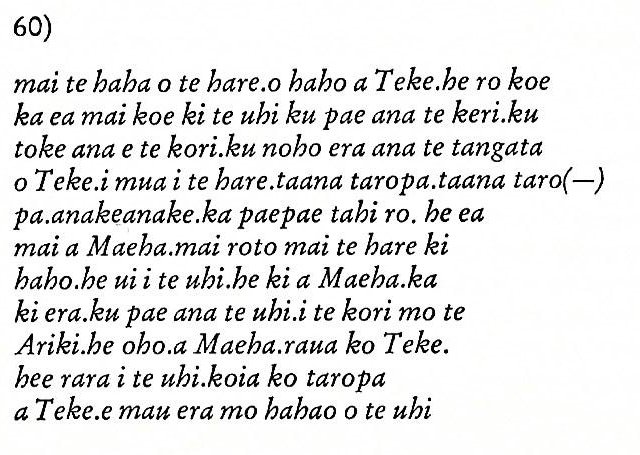
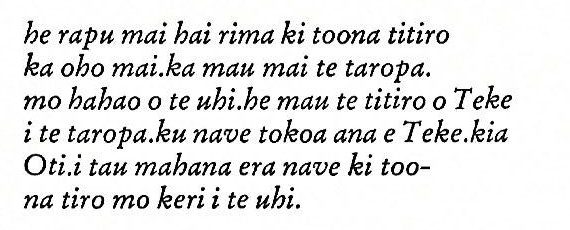
|
he oho.a Teke.raua ko
oti.ko toraua titiro |
Teke, Oti,
and their assistants [toraua titiro] went on.
Teke secretly told [he nave] his assistants,
'Later during the night you are to go (there) and
dig up the yams of my (classificatory) brother (tangata
taina) Maeha.
When you have dug out all the big and small
roots, so that nothing is left in the soil (? ka
paepae tahiro), |
|
tokoa, he nave e
Teke.ki toona titiro.ani(-) |
|
ra.i te po.e oho korua
e tuu. e keri i te |
|
uh(i) era o tooku
tangata taina era.a Maeha |
|
ana keri korua rua nui
rua iti ka paepae. |
|
Pae 1. To
end, to come to an end; ku-pae-á taaku kai, I
have no more food; pae-atu, to leave en
masse; ku-pae-atu-á tagata ki Hangaroa tai.
everybody has left for Hangaroa Bay. 2.
To start, to break out (of wars, fights: taûa);
ku-pae-á te taûa, the fight, the war, has
started. 3. Dressed, edged stones anciently used to
enclose a permanent umu; paepae wall
of undressed stones built as protection against the
wind; also any other protection. Pa'e: Of a
boat, to deviate, to drift, to stray under the
effects of currents or winds; ku-pa'e-á te vaka i
te tokerau, the wind has made the boat deviate
from its course. Vanaga. Paega: 1. Dressed
stones forming the foundations of the ancient houses
or of the walls of the monumental ahus;
hare paega, house with stone foundations;
paega-ahu, ahu wall. 2. Household, people who
live in a hare paega. 3. To lay stones on the
bottom and against the sides of a hole: he-paega
i te rua. Vanaga.
Pae. 1.
Enough. 2. Division of a subject (paiga).
Pau.: paega, a party, a side. Ta.: pae,
division, part. 3. Threshold, sill, joist. P Ta.:
pae, sill, joist. 4. To exhaust, to finish,
past; e ko pae, impregnable; hakapae,
to exhaust, to finish, to end, to execute, to
accomplish, to conclude, to consummate, to consume,
to achieve, to acquit. Paea: 1. Enough, past.
2. To decay, to waste away; paea tooa, to
deprive. Paega, foundation. Paepae,
pavement, plank, canoe; hakapaepae, to lay
planks, to floor. P Pau.: paepae, a raft.
Mgv.: paepae, a pavement, to lay up stones
with regularity into a wall. Mq.: paepae,
elevated pavement on which the house is built. Ta.:
paepae, pavement, raft. Paero, all,
totalit, to sweep off all. Churchill.
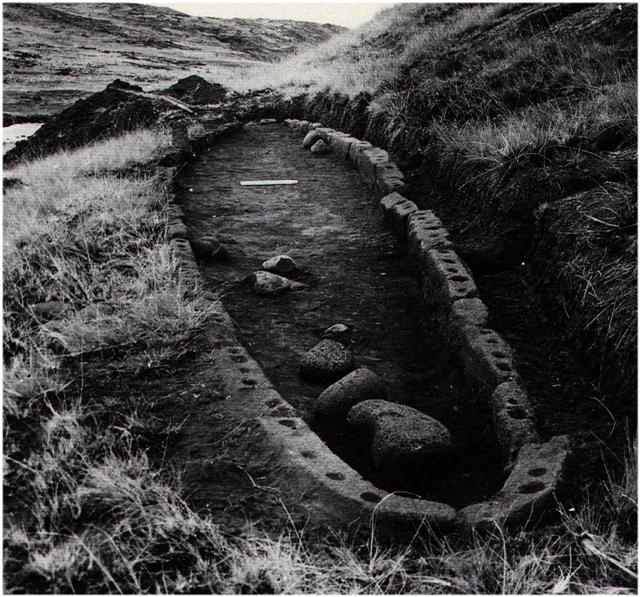
... It is certainly true that
the exterior form of the hare paenga, when
the superstructure and thatch are intact, resembles
an overturned boat, with the form established by the
foundation. However, it is equally true (and perhaps
equally important) that the configuration of the
foundation is otherwise most like the Rapa Nui
vulva design called komari.
The komari is the
quintessential female symbol which is everywhere
prominent in Rapa Nui art, often carved in
rock and wood, incised on human crania, and painted
on the human body. In the hare paenga
foundation form, the komari is cut in stone
and embedded in the earth, the cosmologically female
realm. Spanning above, over and virtually into this
komari foundation is the ridgepole 'backbone'
and curved rafter 'ribs' of what I surmise to be a
symbolically male form. In short, we have a shelter
which may be metaphorically understood as 'the sky
father enclosing his progeny as he embraces the
earth'. Those progeny entered and departed this
male/female, earth/sky form through a low, dark
tunnel which may be logically compared to the birth
canal. This postulated symbolism does not, of
course, negate the 'overturned boat' comparison,
since Polynesian canoes were often likened to the
bodies of great ancestors or to Tane as First
Man. The canoe which transported the first
exploratory voyage to Rapa Nui was said to
have been called The Living Wood, a reference to
Tane. Indeed, it is likely that the 'overturned
boat' concept and its relationship to home, hearth
and lineage, which is so graphically visible, was
commonly understood (hence its retention in the oral
literature), while the more esoteric godly
connections, perhaps along the lines of those
explored here, were known only by spiritual leaders
...
 |
|
E:59 |
|
tahi ro.e
hatihati. e
hakapiipii.ki rava mai |
then you
shall break them up completely and rub the pieces in
your hands. This way, when Maeha names them, I can
find out the names of the various kinds of yams.' [te
ingoa.o te uhi] |
|
ai e au te ingoa.o
te uhi.ana ki (crossed out:
e teke).
e Maeha |
|
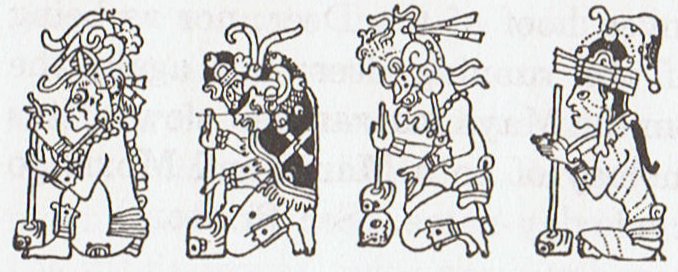 |
|
he ki hokoou a Teke.ki
toona titiro.e keo |
Then Teke
said to his assistants, 'Work quickly until late at
night (? or 'until it gets light', ite ao ana), |
|
mai korua i te ao
ana.ana mai i te taro- |
| Hati
1. To break (v.t., v.i.); figuratively: he hati
te pou oka, to die, of a hopu manu in the
exercise of his office (en route from Motu Nui
to Orongo). 2. Closing word of certain songs.
Vanaga. Hahati. 1. To break (see hati).
2. Roughly treated, broken (from physical exertion:
ku hahati á te hakari) 3. To take to the sea:
he hahati te vaka. Vanaga. Ha(ha)ti.
To strike, to break, to peel off bark; slip,
cutting, breaking, flow, wave (aati, ati,
hahati); tai hati, breakers, surf;
tumu hatihati, weak in the legs; hakahati,
to persuade; hatipu, slate. P Pau.: fati,
to break. Mgv.: ati, hati, to break,
to smash. Mq.: fati, hati, id. Ta.:
fati, to rupture, to break, to conquer.
Churchill. HAKI, v. Haw., also ha'i
and ha'e, primary meaning to break open,
separate, as the lips about to speak, to break, as a
bone or other brittle thing, to break off, to stop,
tear, rend, to speak, tell, bark as a dog; hahai,
to break away, follow, pursue, chase; hai, a
broken place, a joint; hakina, a portion,
part; ha'ina, saying; hae, something
torn, as a piece of kapa or cloth, a flog,
ensign. Sam., fati, to break, break off;
fa'i, to break off, pluck off, as a leaf, wrench
off; fai, to say, speak, abuse, deride;
sae, to tear off, rend; ma-sae, torn.
Tah., fati, to break, break up, broken;
fai, confess, reveal, deceive; faifai, to
gather or pick fruit; haea, torn, rent; s.
deceit, duplicity; hae-hae, tear anything,
break an agreement; hahae, id. Tong., fati,
break, rend. Marqu., fati, fe-fati, to
break, tear, rend; fai, to tell, confess;
fefai, to dispute. The same double meaning of
'to break' and 'to say' is found in the New Zealand
and other Polynesian dialects.
Malg., hai, haïk, voice,
address, call. Lat., seco, cut off, cleave,
divide; securis, hatchet; segmentum,
cutting, division, fragment; seculum (sc.
temporis), sector, follow eagerly, chase,
pursue; sequor, follow; sica, a
dagger; sicilis, id., a knife; saga,
sagus, a fortune-teller. Greek, άγνυμι,
break, snap, shiver, from Ѓαγ
(Liddell and Scott); άγν, breakage,
fragment; έκας,
adv, far off, far away. Liddell and Scott
consider έκας akin to
έκαςτος,
each, every, 'in the sense of apart, by itself', and
they refer to the analysis of Curtius ... comparing
Sanskrit kas,
kâ,
kat (quis,
qua,
quid),
who of two, of many, &c. Doubtless
έκας and
έκαςτος
are akin 'in the sense of apart, by itself', but
that sense arises from the previous sense of
separating, cutting off, breaking off, and thus more
naturally connects itself with the Latin
sec-o,
sac-er,
and that family of words and ideas, than with such a
forced compound as
είς and κας. Sanskr., sach, to
follow. Zend, hach, id. (Vid. Haug, 'Essay on
Parsis'.) I am well aware that most, perhaps
all, prominent philologists of the present time -
'whose shoe-strings I am not worthy to unlace' -
refer the Latin
sequor,
secus, even
sacer, and the Greek
έπω, έπομαι,
to this Sanskrit sach. Benfey even refers the
Greek έκας to this sach, as
explanatory of its origin and meaning. But, under
correction, and even without the Polynesian
congeners, I should hold that sach, 'to
follow', in order to be a relative to sacer,
doubtless originally meaning 'set apart', then
'devoted, holy', and of έκας, 'far off',
doubtless originally meaning something 'separated',
'cut off from, apart from', must also originally
have had a meaning of 'to be separated from, apart
from', and then derivatively 'to come after, to
follow'. The sense of 'to follow' implies the sense
of 'to be apart from, to come after', something
preceding. The links of this connection in sense are
lost in Sanskrit, but still survive in the
Polynesian haki, fati, and its
contracted form hai, fai, hahai,
as shown above. I am therefore inclined to rank the
Latin sequor as a derivative of seco, 'to cut
off, take off'. Welsh, haciaw, to hack;
hag, a gash, cut; segur, apart, separate;
segru, to put apart; hoc, a bill-hook;
hicel, id. A.-Sax., saga, a saw;
seax, knife; haccan, to cut, hack;
sægan, to saw; saga, speech, story;
secan, to seek. Anc. Germ., seh, sech,
a ploughshare. Perhaps the Goth. hakul,
A.-Sax. hacele, a cloak, ultimately refer
themselves to the Polynes. hae, a piece of
cloth, a flag. Anc. Slav., sieshti (siekā),
to cut; siekyra, hatchet. Judge Andrews in
his Hawaiian-English Dictionary observes the
connection in Hawaiian ideas between 'speaking,
declaring', and 'breaking'. The primary idea, which
probably underlies both, is found in the Hawaiian
'to open, to separate, as the lips in speaking or
about to speak'; and it will be observed that the
same development in two directions shows itself in
all the Polynesian diaclects, as well as in several
of the West Aryan dialects also. Fornander.
Piki.
To climb, to mount, to go up; piki aruga, to
surpass; pikipiki, to embark, to go aboard;
hakapiki, to climb. P Pau.: piki, to
climb, to ascend, to mount. Mgv.: piki, to
mount, to go up, to climb. Mq.: piki, pií,
to mount, to climb, to go aloft. Ta.: pii, to
mount. Pikiga, ascent, steps, stairs; Mgv.:
pikiga, a stair, ladder, step. Pikipiki:
rauoho pikipiki, black hair and curly.
P Pau.: tupikipiki, to curl, to frizzle.
Churchill. Pau.: pikiafare, cat. Ta.:
piiafare, id. Churchill. PI'I, v.
Haw., to strike upon or extend, as the shadow on the
ground or on a wall; to ascend, go up. N. Zeal.,
piki, to ascend. Sam.: pi'i, to cling to
to climb. Marqu., piki, to climb, ascend;
piki-a, steps, acclivity. Tong., piki, to
adhere to, to climb, ascend. Fiji., bici-bici,
a peculiar kind of marking on native cloth.Sanskr.,
pin'j, to dye or colour; pin'jara,
yellow, tawny. Lat., pingo, to paint,
represent, embroider. The marking out or tracing a
shadow on the ground or on a wall was probably the
primary attempt at painting. In the Hawaiian alone
the sense of an ascent, compared to the lengthening
of the shadows, has been retained. As the sun
descended the shadows were thought to ascend or
creep up the mountain-side. The sense of 'marking,
tracing', seems only to have been retained in the
Fijian, where so much other archaic Polynesian lore
has been retained, and thus brings this word in
connection with the Sanskrit and Latin. Fornander.
Pi. Mgv.:
pi, full,
complete. Mq.: pi,
id. Churchill.
Ta.: pi,
young, green. Ma.: pipi,
half-grown, not matured. Churchill. PI,
v. Haw., to sprinkle, as water; to throw
water with the hand; pi-pi, ka-pi, id.
Sam., pi, to splash, slap, as a fish in a
trap; ta-pi, rinse with fresh water; pisi,
to splash with water. Tah., pi-pi, sprinkle
with water. Sanskr., pi = pâ, to
drink; piv, id.; pinu, to sprinkle;
pitha, a drink, water; pipâsâ, thirst.
Greek, πινω, to drink; πιστρα, a
drinking trough, drink, water; πιπισκω,
give to drink; πωμα,
drink, liquor, &c. Lat., bibo,
to drink; bibulus,
potus.
Slav., pi,
piti,
pivati,
to drink.The transition from the sense conveyed in
the Polynesian to that in the West Aryan tongues
will be intelligible to those who have observed the
manner of drinking which probably obtained before
cups or containers were used, and which is still
very common among the Polynesians when travelling;
it is by 'throwing the water with the hand' from the
spring or river to the mouth. That primary sense
seems to have survived in the Sanskrit
pinu, to sprinkle.
Fornander.
... in the ceremonial course
of the coming year, the king is symbolically
transposed toward the Lono pole of Hawaiian
divinity ... It need only be noticed that the
renewal of kingship at the climax of the Makahiki
coincides with the rebirth of nature. For in the
ideal ritual calendar, the kali'i battle
follows the autumnal appearance of the Pleiades, by
thirty-three days - thus precisely, in the late
eighteenth century, 21 December, the winter
solstice. The king returns to power with the sun.
Whereas, over the next two days, Lono plays
the part of the sacrifice. The Makahiki
effigy is dismantled and hidden away in a rite
watched over by the king's 'living god',
Kahoali'i or 'The-Companion-of-the-King', the
one who is also known as 'Death-is-Near' (Koke-na-make).
Close kinsman of the king as his ceremonial double,
Kahoali'i swallows the eye of the victim in
ceremonies of human sacrifice ... In the deep night
before the image [of Lono] is first seen,
there is a Makahiki ceremony called
'splashing-water' (hi'uwai). Kepelino tells
of sacred chiefs being carried to the water where
the people in their finery are bathing; in the
excitement created by the beauty of their attire,
'one person was attracted to another, and the
result', says this convert to Catholicism, 'was by
no means good'. At dawn, when the people emerged
from their amorous sport, there standing on the
beach was the image of Lono. White tapa
cloth and skins of the ka'upu bird hang from
the horizontal bar of the tall crosspiece image. The
ka'upu is almost certainly the albatross, a
migratory bird that appears in the western Hawaiian
chain - the white Lanyon albatross at Ni'ihau
Island - to breed and lay eggs in October-November,
or the beginning of the Makahiki season ...
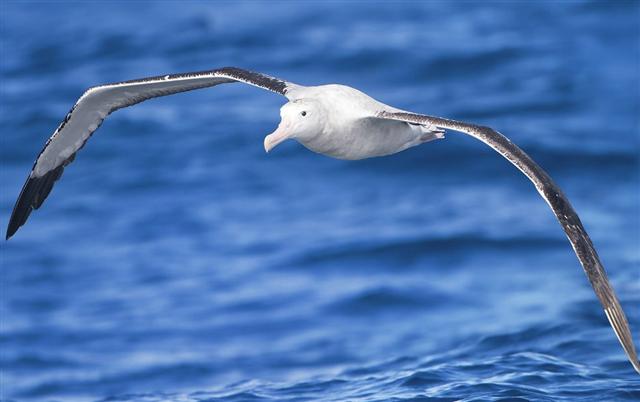 |
|
pa.mo hahao o te uhi.he
hakahoki mai |
when you
shall take the baskets
and fill them up with yams.' To this they replied,
'Agreed.' |
|
i te kī.ku mao ana.he
oho.a Teke.he tuu ki te |
|
... As has already been mentioned, the Delphians
worshipped Dionysus once a year as the new-born
child, Liknites, 'the Child in the Harvest
Basket', which was a shovel-shaped basket of rush
and osier used as a harvest basket, a cradle, a
manger, and a winnowing-fan for tossing the grain up
into the air against the wind, to separate it from
the chaff. The worship of the Divine Child was
established in Minoan Crete, its most famous early
home in Europe. In 1903, on the site of the temple
of Dictaean Zeues - the Zeus who was yearly born in
Rhea's cave at Dicte near Cnossos, where Pythagoras
spent 'thrice nine hallowed days' [27] of his
initiation - was found a Greek hymn which seems to
preserve the original Minoan formula in which the
gypsum- [white-] powdered, sword-dancing Curetes, or
tutors, saluted the Child at his birthday feast. In
it he is hailed as 'the Cronian one' who comes
yearly to Dicte mounted on a sow and escorted by a
spirit-throng, and begged for peace and plenty as a
reward for their joyful leaps ... |
|
hare o
Maeha.he tuu
he no(ho).
i ira ana i moe ai |
Teke went
away and came to the house of Maeha [he tuu ki te
hare o Maeha]. There he lay down (?) as
though he were going to sleep that night. |
|
i tau po era. |
| Ma'eha.
Brightness, bright, to lighten, to brighten up; ku
ma'eha-á, it has already lightened up. Vanaga. 1.
Light, brightness; to shine, to be bright, to glimmer,
to glow; maeha mahina, moonshine; maeharaa,
sunrise. Maehamaeha, bright. Hakamaeha, to
brighten. Mq.: maeoeo, bright, transparent. 2. To
get out of the way. 3. Thin, slender, slight. Churchill.
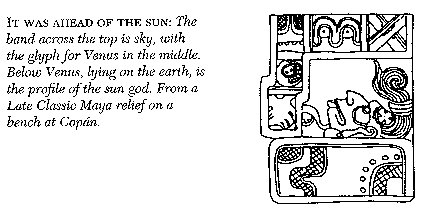
Noi. To
bend down toward the ground, to bow down, to worship.
Hakanoi, to prostrate oneself. Ta.: Noinoi,
small, fine. Mq.: noi, a dwarf, of slow growth.
Ha.: noinoi, small, as a dwarf. Churchill. |
|
he po.he oho.
te tangata.erima te kauatu.ki te |
It grew
dark [he po], and fifty men came to dig up
the yams.
They arrived [he tuu), dug out [he keri]
the yam roots, and rubbed small pieces of them
between their hands [hakapiipii
→ Tah., pi-pi, sprinkle with water]
... |
|
uhi keri.he tuu he
keri. i te uhi
hakapii(-) |
| Keri.
To dig, to grub up, to root up, to excavate, to mine;
rubbish; the wake of a ship; to sow (kekeri).
Kerikeri, to scratch. Keriga, excavation.
Kerihaga oone, farmer. P Pau.: keri,
to dig. Mgv.: keri, to dig, to scrape. Mq.:
kei, to dig, to spade up, to excavate, to work the
soil. Ta.: eri, to mine. The manner of digging
underlies the sense of this word; the digging implement
is a sharpened stick (oka) driven into the earth
by arm power and then used as a lever to loosen the
mold. Churchill. ... Then the canoe
was made to drink salt water; it was dipped forwards and
backwards in the waves of the great moving altar of the
gods and thus consecrated to Tane. A marae
was made for him in the little house aft of the deck,
and the three masts were rigged with ropes and strong
mats for sails and long tapa pennants streaming
from them ...
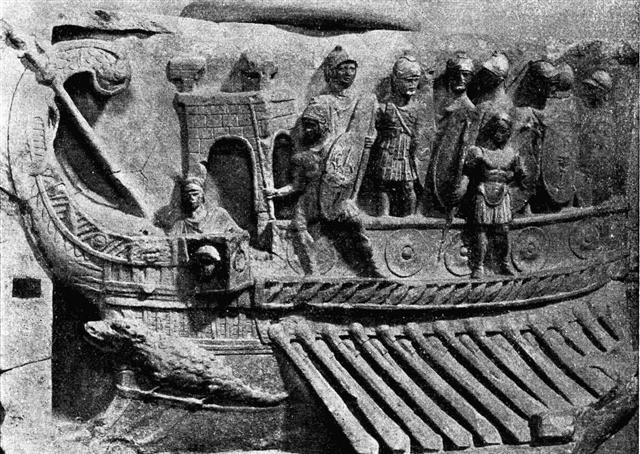 |
|
pii i te uhi.he ngaroa e
Maeha.te heruru (crossed out: |
Maeha heard
something, namely the noise that the men made, and he
said [he ki mai mai te rua painga] from the other side (of the house) to Teke, 'Hey
you! This is the first time that such a noise has been
heard at night.' [he ki mai a Teke] Teke answered from his side (of the
house) [mai toona painga], 'My feet have made the noise that you heard.' [he
vae ooku tau hetu ena.a koe hakarongo ena] And he very carefully [koro iti] made a noise
[hakahetu] with his feet [i toona vae]. |
|
o Maeha) o te
tangata.heki mai mai te rua painga |
|
kia Teke.he ro koe ka tahi
ana po.i he ruru ro mai |
|
he ki mai a Teke.mai toona
painga.he vae ooku |
|
tau hetu ena.a koe e
hakarongo ena.ai ka haka(-) |
|
Ru. A chill, to
shiver, to shudder, to quake; manava ru, groan.
Ruru, fever, chill, to shiver, to shake, to
tremble, to quiver, to vibrate, commotion, to apprehend,
moved, to agitate, to strike the water, to print;
manava ruru, alarm; rima ruru, to shake
hands. P Pau.: ruru, to shake, to tremble. Mgv.:
ru, to shiver with cold, to shake with fever, to
tremble. Mq.: ú, to tremble, to quiver. Ta.:
ruru, to tremble. Churchill. Mgv.: eager, in haste,
impatient. Ta.: ru, impatience, haste. Churchill.
Ruru, to tremble, an earthquake. Sa.: lūlū,
lue, to
shake. To.: luelue,
to roll; lulu,
to shake. Fu.: lulū,
to tremble, to shake, to agitate. Niuē: luelue,
to shake; lūlū,
to shake, to be shaken. Nuguria: ruhe,
motion of the hands in dancing; luhe henua,
an earthquake. Uvea, Ha.: lu,
lulu,
lululu, to shake, to
tremble, to flap. Fotuna: no-ruruia,
to shake. Ma.: ru,
ruru, to
shake, an earthquake. Ta., Rarotonga, Rapanui, Pau.:
ruru, to
shake, to tremble. Mgv.: ru,
to tremble; ruru,
to shake. Mq.: uu,
to shake the head in negation; uuuu,
to shake up. Uvea: ue i,
to shake; ueue,
to move. Rapanui: ueue,
to shake. Churchill 2.
... When this tremendous task had been accomplished
Atea took a third husband, Fa'a-hotu, Make
Fruitful. Then occurred a curious event. Whether Atea
had wearied of bringing forth offspring we are not told,
but certain it is that Atea and her husband
Fa'a-hotu exchanged sexes. Then the [male] eyes of
Atea glanced down at those of his wife Hotu
and they begat Ru. It was this Ru who
explored the whole earth and divided it into north,
south, east, and west ...
Paina.
Human likeness, large doll (made in ancient times).
Vanaga. T. To make a noise. H. To sound, as in breaking
or tearing anything. Churchill. - ... Der Cultus bestand
in Anrufung der Götter, deren Willen der Priester
erklärte, in Opfern an Lebensmitteln, auch an Menschen,
und in der Feier gewisser, zu bestimmten Zeiten
wiederkehrender Feste (rakauti), von denen das
erste im Früjahr 2 Monate dauerte, das zweite im Sommer
mit der Errichtung einer Pyramide aus Zweigen (paina)
endete, das dritte in den Winter fiel; bei allen fanden
Tänze, Gesänge, Spiele aller Art statt ... |
| Teke
and Maeha were 'brothers', located at
opposite sides of 'the house'.
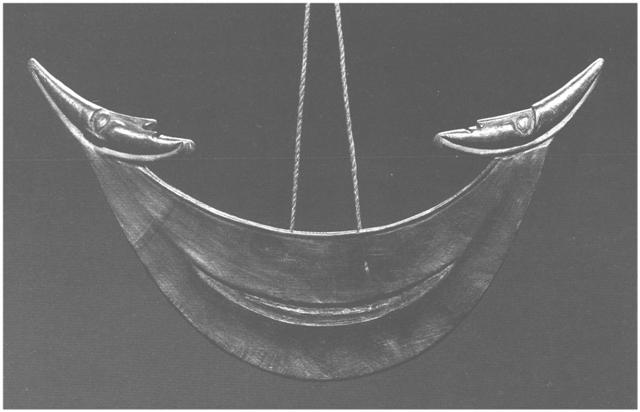 |
|
hetu koro iti no.i
toona vae.he otea.he ea a Teke |
It grew
light [he otea] and Teke went out [he ea a
Teke ki haho] in the twilight to urinate [i
te po ana mimi]. |
|
ki haho.i te po ana
mimi.he ki hokoou mai |
|
... There was no water in the
village. The lakes and rivers were dry. Raven and Crow,
two young girls who were having their first menstrual
courses, were told to go and draw water from the ocean.
Finding the journey too long, Raven decided just to
urinate into her basket-bucket. She decieved no one and
was severly scolded. Crow returned much later but with
drinking water. As a punishment, Raven was condemned
never to find water in the summer; only in winter would
she find something to drink. For that reason the Raven
never drinks during the hot months; she speaks with a
raucous voice because of her dry throat ...
Puku.
1. To feel an urge to defecate or to urinate, etc.:
ku-puku-á te mimi: to need to urinate. 2. Rock,
boulder: puku ma'ea; puku oone, hillock,
earth mound. Vanaga.
... On the fifteenth day of the month of October (tangaroa
uri), Nonoma left the house during the
night to urinate outside ...
(E:75 → 59 + 16)
|
1 |
60 |
Banana shoots |
te huri maika |
|
2 |
61 |
Taro seedlings |
te uru taro |
|
3 |
62 |
Sections of
Sugarcane |
tepupura toa |
|
4 |
63 |
Yam roots |
te uhi |
|
5 |
64 |
Sweet potatoes |
te rau kumara |
|
6 |
65 |
Hauhau trees |
te hauhau |
|
7 |
66 |
Paper Mulberry
trees |
te mahute |
|
8 |
67 |
Sandalwood trees |
te naunau |
|
9 |
68 |
Toromiro trees |
te toromiro |
|
10 |
69 |
Ferns |
te riku |
|
11 |
70 |
Rushes |
te ngaatu |
|
12 |
71 |
Yellow roots |
te pua |
|
13 |
72 |
Tavari plants |
te tavari |
|
14 |
73 |
Moss |
te para |
|
15 |
74 |
Nga Oho plants |
te ngaoho |
|
16 |
75 |
Grass |
te mauku tokoa |
|
|
E:60 →
March 1 |
|
mai
te haha o te hare.o
haho a Teke.he ro koe |
Then [hokoou]
Teke called out from the door, from outside [o
haho], 'Hey you! Hurry out to our yams! [ka
ea mai koe ki te uhi]' The digging of the yams
was over [ka pae ana te keri] and the thieves
had stolen [ku toke] the yams.
Earlier Teke's men had placed [ku noho era] the baskets in front of the house [i mua i te
hare], every one of his baskets (? ka paepae
tahi ro). |
|
ka ea mai koe ki te uhi
ka pae ana te keri.ku |
|
toke ana e te kori.ku
noho era ana te tangata |
|
o Teke.i mua i te
hare.taana taropa.taana taro(-) |
|
pa.anakeanake.ka.
paepae tahi ro. he ea |
| Haha.
1. Mouth (oral cavity, as opposed to gutu,
lips). 2. To carry piggy-back. He haha te poki i
toona matu'a, the child took his father on his
back. Ka haha mai, get onto my back (so I may
carry you). Vanaga. 1. To grope, to feel one's way;
po haha, darkness, obscure. 2. Mouth, chops,
door, entrance, window; haha pipi, small
mouth; haha pipiro, foul breath; ohio haha,
bit of bridle; tiaki haha, porter,
doorkeeper. Churchill. Hare. House, family,
home. Vanaga. House, cabin, habitation, building,
hut, structure; hare iti, hut; hare itiiti
no, cabin; hare kahu, tent; hare
neinei, latrine; hare no iti, cell;
hare nunui, palace; hare pohurihuri,
prison; hare pure, chapel, church; ki te
hare, at home. Harepepe, kelp.
Harepiko, a. asylum, place of refuge; b. ambush,
snare. Harepopo, shed. Harepopokai,
storehouse. Churchill.
Pae.
1. To end, to come to an end; ku-pae-á taaku kai,
I have no more food; pae-atu, to leave
en masse; ku-pae-atu-á tagata ki Hangaroa
tai. everybody has left for Hangaroa Bay.
2. To start, to break out (of wars, fights: taûa);
ku-pae-á te taûa, the fight, the war, has
started. 3. Dressed, edged stones anciently used to
enclose a permanent umu; paepae wall
of undressed stones built as protection against the
wind; also any other protection. Pa'e: Of a
boat, to deviate, to drift, to stray under the
effects of currents or winds; ku-pa'e-á te vaka i
te tokerau, the wind has made the boat deviate
from its course. Vanaga. Paega: 1. Dressed
stones forming the foundations of the ancient houses
or of the walls of the monumental ahus;
hare paega, house with stone foundations;
paega-ahu, ahu wall. 2. Household, people who
live in a hare paega. 3. To lay stones on the
bottom and against the sides of a hole: he-paega
i te rua. Vanaga. 1. Enough. 2. Division of a
subject (paiga). Pau.: paega, a party,
a side. Ta.: pae, division, part. 3.
Threshold, sill, joist. P Ta.: pae, sill,
joist. 4. To exhaust, to finish, past; e ko pae,
impregnable; hakapae, to exhaust, to finish,
to end, to execute, to accomplish, to conclude, to
consummate, to consume, to achieve, to acquit.
Paea: 1. Enough, past. 2. To decay, to waste
away; paea tooa, to deprive. Paega,
foundation. Paepae, pavement, plank, canoe;
hakapaepae, to lay planks, to floor. P Pau.:
paepae, a raft. Mgv.: paepae, a
pavement, to lay up stones with regularity into a
wall. Mq.: paepae, elevated pavement on which
the house is built. Ta.: paepae, pavement,
raft. Paero, all, totalit, to sweep off all.
Churchill.
|
1 |
2 |
3 |
4 |
5 |
|
Maui mua |
Maui roto |
Maui taha |
Maui pae |
Maui tikitiki |
|
First |
Middle |
Side |
Edge |
Topknot |
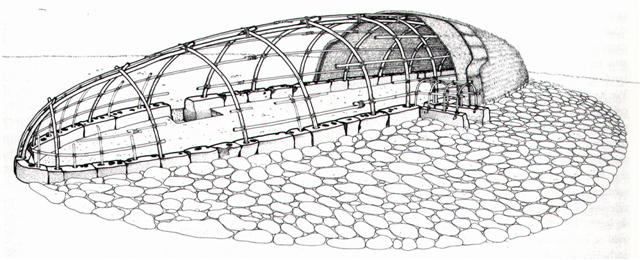
|
|
mai a Maeha.mai roto
mai te hare ki |
Maeha came
out of the house, saw the yam (plantation) [he ui
i te uhi], and said, 'The yams are gone because
of the theft for the king.' [ku pae ana te
uhi.i te kori mo te Ariki] |
|
haho.he ui i te uhi.he
ki a Maeha.ka |
|
ki era.ku pae ana te
uhi.i te kori mo te |
|
Ariki.he oho.a
Maeha.raua ko Teke. |
Maeha and
Teke went out [he oho.a Maeha.raua ko Teke]
and inspected the yam (plantations). There it was,
Teke's basket [koia ko taropa a Teke], which
is used to store yams. |
|
hee rara i te uhi.koia
ko taropa |
|
a Teke.e mau era mo
hahao o te uhi |
|
he rapu mai hai rima ki
toona titiro |
He motioned
to his assistants with his hand [he rapu mai hai
rima], 'Come here and take the basket and put in
the yams.' |
|
ka oho mai.ka mau mai
te taropa. |
|
mo hahao o te uhi.he
mau te titiro o Teke |
Teke's assistants took
the basket. [he mau te titiro o Teke i te taropa] |
|
i te taropa.ku nave
tokoa ana e Teke.kia |
Teke had
told Oti about the secret in (words), (i.e., in
amicable familiarity) [ku nave tokoa ana e
Teke.kia Oti], had secretly talked to his
assistants to dig out the yams. |
|
Oti.i tau
mahana era nave ki too- |
|
na tiro mo keri i te
uhi. |
| Mahana.
1. Tepid, lukewarm, warm; vai mahana,
warm water. 2. To stop raining; he-mahana te ûa,
the rain has stopped. Vanaga. 1. Heat, hot (maana,
hana, pumahana); mahana ke,
suffocating; mahana nui, stifling;
mahana no iti, lukewarm; vera mahana,
hot; hakamahana, to heat, to scald, to warm
over. 2. Finery. Churchill. The five stages
of a baby's development are: kaukau, puepe,
tahuri, totoro, mahaga. Puepue = said of
a newborn baby when, a few weeks old, it begins to
distinguish people and objects: ku-puepue-á te
poki. Tahuri = of a new-born baby, to
move from side to side: ku-tahuri-á te poki.
Totoro = to crawl; ki totoro te poki,
when the baby crawls. Mahaga = baby when able
to stand by itself. Vanaga. [oti → Oti] |
.jpg)
There was a reversal at Janus, the god of doors, and
therefore another reversal had to come half a year later,
at another door in high summer, when the new year child would
have grown up to
full maturity. Here the first half of the year would come to
its end (oti).
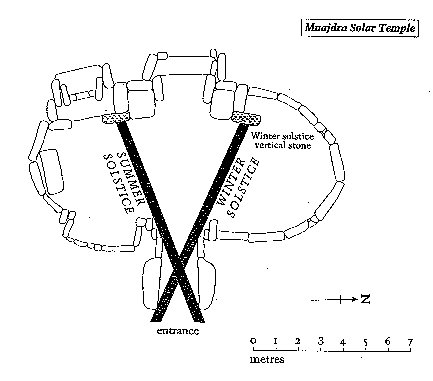
The 2nd half of the year was beginning here, the half when
the Sun began (his her) journey downwards (he turu). Also
here there was a door (of uncertain outcome). 366 = 364 + 2.
... Ganz ähnlich is der Name 'Gott von Duazag' des
Gottes Nabū ... zu erklären.
Er bezeichnet ihn als den Gott des Wachtstums, welches als
aus dem Osten stammend betrachtet wird, weil die Sonne, die
das Wachstum bringt, im Osten aufgeht.
Dass aber Nabū als Ost-Gott aufgefasst wurde, hängt
damit zusammen, dass sein Stern, der Mercur, nur im Osten
oder Westen sichtbar ist
... Already the ancient Babylonians associated winter
solstice, and also summer solstice, with uncertainty ('the
chamber of hazard' months, Ubšugina respectively
Duazaga) ... the future is always uncertain ...
Only the 2nd half of the ship (the female half) would
survive, would remain visible.
... There is a couple residing in one place named Kui
[Tui] and Fakataka [Hakataka]. After
the couple stay together for a while Fakataka is
pregnant. So they go away because they wish to go to another
place - they go. The canoe goes and goes, the wind roars,
the sea churns, the canoe sinks. Kui expires while
Fakataka swims. Fakataka swims and swims,
reaching another land. She goes there and stays on the
upraised reef in the freshwater pools on the reef, and there
delivers her child, a boy child. She gives him the name
Taetagaloa ...
... When this tremendous task had been accomplished Atea
took a third husband, Fa'a-hotu, Make Fruitful. Then
occurred a curious event. Whether Atea had wearied of
bringing forth offspring we are not told, but certain it is
that Atea and her husband Fa'a-hotu exchanged
sexes. Then the [male] eyes of Atea glanced down at
those of his wife Hotu and they begat Ru. It
was this Ru who explored the whole earth and divided
it into north, south, east, and west ...
... It is an interesting fact, although
one little commented upon, that myths involving a canoe
journey, whether they originate from the Athapaskan and
north-western Salish, the Iroquois and north-eastern
Algonquin, or the Amazonian tribes, are very explicit about
the respective places allocated to passengers. In the case
of maritime, lake-dwelling or river-dwelling tribes, the
fact can be explained, in the first instance, by the
importance they attach to anything connected with
navigation: 'Literally and symbolically,' notes Goldman ...
referring to the Cubeo of the Uaupés basin,
'the river is a binding thread for the people. It is a
source of emergence and the path along which the ancestors
had travelled. It contains in its place names genealogical
as well as mythological references, the latter at the
petroglyphs in particular.' A little further on ... the same
observer adds: 'The most important position in the canoe are
those of stroke and steersman. A woman travelling with men
always steers, because that is the lighter work. She may
even nurse her child while steering ... On a long journey
the prowsman or stroke is always the strongest man, while a
woman, or the weakest or oldest man is at the helm
...
.jpg)
|










.jpg)

.jpg)